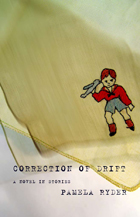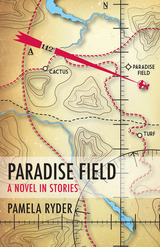2 books about Ryder, Pamela

Correction of Drift
A Novel in Stories
Pamela Ryder
University of Alabama Press, 2008
Explores the lives behind the headlines of the Lindbergh baby kidnapping, evoking anew the scope of tragedy through the vision of literary fiction.
Every character brings a different past life to the event, be it a life of celebrity, or of misfortune and obscurity. There is Anne Morrow Lindbergh—daughter of a millionaire, the shy poet who married a national hero; Charles Lindbergh—the rough-and-tumble Minnesota barnstormer, who at age twenty-five made the first transatlantic flight, bringing him world-wide prestige; Violet—the skittish family maid with a curious attachment to the boy and a secret life that lapses into hysteria and self-destruction; and the kidnappers—an assembly of misfits with their own histories of misery. All are bound by the violence, turmoil, and mystery of the child’s disappearance as it becomes evident that each life has been irrevocably changed. Patterns of bereavement and loss illuminate these stories: despair at the death of a child; the retreat into seclusion; the comfort and the desolation of a marriage. But the heart of this novel is the far-reaching nature of tragedy, and the ways the characters go on to live—or end—their lives.
[more]

Paradise Field
A Novel in Stories
Pamela Ryder
University of Alabama Press, 2017
Interconnected stories depicting the last years of a WWII bomber pilot, his relationship with his daughter as both child and adult, and his drift into infirmity and death.
When life dwindles to its irrevocable conclusion, recollections are illuminated, even unto the grave. Such is the narrative of Paradise Field: A Novel in Stories, whose title is taken from a remote airfield in the American Southwest, and while the father recalls his flying days, his daughter—who nurses the old man—reflects as well.
Pamela Ryder’s stories vary in style and perspective, and time lines overlap as death advances and retreats. This unique and shifting narrative explores the complexities of a relationship in which the father—who has been a high-flying outsider—descends into frailty and becomes dependent upon the daughter he has never really known.
The opening story, “Interment for Yard and Garden,” begins as a simple handbook for Jewish burial and bereavement, although the narrator cannot help but reveal herself and her motives. From there, the telling begins anew and unfolds chronologically, returning to the adult daughter’s childhood: a family vacation in France, the grotesqueries of the dinner table, the shadowy sightings of a father who has flown away.
A final journey takes father and daughter back to the Southwest in search of Paradise Field. Their travels through that desolate landscape foreshadow the father’s ultimate decline, as portrayed in the concluding stories that tell of the uneasy transformation in the bond between them and in the transcendence of his demise. Taken together, the stories in Paradise Field are an eloquent but unsparing depiction of infirmity and death, as well as solace and provocation for anyone who has been left to stand graveside and confront eternity.
When life dwindles to its irrevocable conclusion, recollections are illuminated, even unto the grave. Such is the narrative of Paradise Field: A Novel in Stories, whose title is taken from a remote airfield in the American Southwest, and while the father recalls his flying days, his daughter—who nurses the old man—reflects as well.
Pamela Ryder’s stories vary in style and perspective, and time lines overlap as death advances and retreats. This unique and shifting narrative explores the complexities of a relationship in which the father—who has been a high-flying outsider—descends into frailty and becomes dependent upon the daughter he has never really known.
The opening story, “Interment for Yard and Garden,” begins as a simple handbook for Jewish burial and bereavement, although the narrator cannot help but reveal herself and her motives. From there, the telling begins anew and unfolds chronologically, returning to the adult daughter’s childhood: a family vacation in France, the grotesqueries of the dinner table, the shadowy sightings of a father who has flown away.
A final journey takes father and daughter back to the Southwest in search of Paradise Field. Their travels through that desolate landscape foreshadow the father’s ultimate decline, as portrayed in the concluding stories that tell of the uneasy transformation in the bond between them and in the transcendence of his demise. Taken together, the stories in Paradise Field are an eloquent but unsparing depiction of infirmity and death, as well as solace and provocation for anyone who has been left to stand graveside and confront eternity.
[more]
READERS
Browse our collection.
PUBLISHERS
See BiblioVault's publisher services.
STUDENT SERVICES
Files for college accessibility offices.
UChicago Accessibility Resources
home | accessibility | search | about | contact us
BiblioVault ® 2001 - 2024
The University of Chicago Press









